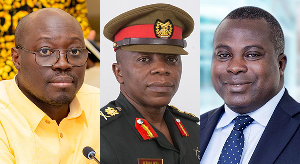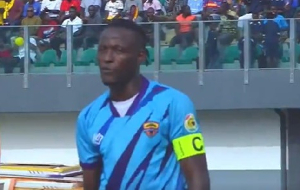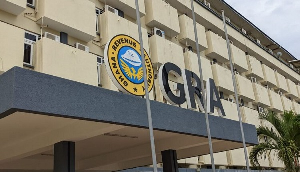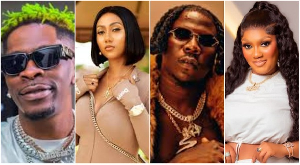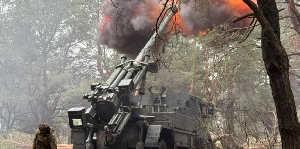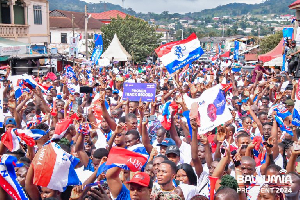Kofi Akosah-Sarpong* argues that despite Guinea and Ghana being twin brothers, 50 years on, Guinea came out defectively and is mired in long-running insecurities, and may need Ghana’s help to secure it
By Kofi Akosah-Sarpong
It is pathetic for a country’s President to die and within some few hours a military coup taking place. It didn’t happen in Gen. Gnassingbe Eyadema’s Togo but Gen. Sani Abacha’s Nigeria. That’s pretty much primitive in a world of growing civility where Barack Obama, an African (Kenyan)-American, is the President-elect of the most powerful country in the world, the United States of America. In Obama, the Americans have moved over from such archaic politics by electing an African-American – nobody thought an African-American would ever be elected as President of the USA.
But some parts of the world are still embroiled in diffident politics, resisting to be weaned from baby-feeding. The Guinean military coup says a lot about Guinea, but that’s Guinea at work. A few hours after President Lansana Conte died; Guinea’s perennially restless military staged a coup, throwing any constitutional procedure to resolve the transition process to their half of the Atlantic Ocean. It may sound heartbreaking but that’s Guinea, and to understand Guinea is not to be surprised by the rapid unpalatable unfolding of its events. The Guinean events isn’t symptomatic of Africa, it’s peculiarly Guinean with its unique idiosyncrasies and mindset. The era of the rest of the world saying what happens in one African country is symptomatic of Africa is over. Despite Ghana and Guinea being twin-brothers they are different in their mindsets. That makes the Guinean topic different from Zimbabwe’s quandary and Ghana’s increasing democratic growth, progress and global respect. But some may ask, but Guinea and Ghana are brothers!!! Yes, they are brothers to the extent that when Ghana was very wealthy, under First President Kwame Nkrumah, Ghana helped Guinea with millions of dollars to achieve its independence from France. (Nkrumah spent his 6 years in exile in Guinea with his Pan-African brother Sekou Toure before dying in April, 1972). But brothers, even twins, can come out differently in life – one doing well and the other doing deficiently; one true itself, the other a chronic pretender. For the past 50 years, Guinea and Ghana have come out differently – while Ghana is rightly growing democracy, freedoms, progress and attempting to integrate its traditional values into its neo-liberal heritage, Guinea isn’t, and instability, dreadful one-party systems, long-running military juntas, unfreedoms, fear, threats of civil war, and collapsing development institutions are still dangling on its messed-up head. Regardless of drawing parallels Africa-wide, the journalist Richard Dowden (formerly of the London, UK-based The Economist) indicates in his new Africa: Altered States, Ordinary Miracles that each African state should be seen not necessarily from its own distinct milieu but also its “different misgovernment.” While Ghana is progressively learning from its years of misgovernment and enlarging democracy and freedoms, Guinea, its twin brother, appears retarded and should be seen simultaneously in its own environment and its leaders/elites unique lack of common sense. Despite starting on brilliant note on October 2, 1958, at the cost of the instantaneous termination of all French assistance, when first President Ahmed Sékou Touré took a famous exceptional path and called the bluff of French President Charles de Gaulle’s referendum given French colonies the choice between immediate independence or retaining their colonial status. With independence, Guinea pursued a mixture Soviet-type radical socialism and Pan Africanism without any hint of flexibility in its development process. Ghana had wrongly done so but Ghana has moved on big time from years stupidity and intellectual weaknesses. While Ghana experienced 21 years military juntas and 6 years of one-party systems and has moved on, driving enviable democratic ethos, Guinea is still enmeshed in almost 50 years of military juntas and one-party systems with the shocking December 23, 2008 military coup that enlarges its misgovernment. Toure effectively shut Guinea out from the rest of world’s development process. Practically, that started Guinea’s befuddled state under the brutally tyrannical grip of Toure who suppressed democratic aspirations, raised tribalism dangerously high, muzzled freedoms, killed the rule of law, and effectively asphyxiated Guinea’s progress. Disturbing ethnicity became the order of the day, undermining Guinea’s Pan-Africanism image, and seeing Toure, a Mandingo, effectively killing and scattering the increasingly progressive Fulah ethnic group, who form about 40 percent of the Guinean population. Till he died in 1984, Toure didn’t demonstrate any grasp of Guinea - forget about his Pan-Africanism philosophy ranting - especially the appropriation of the traditional values of the coalition of the ethnic groups that form Guinea and its neo-liberal heritage. There were virtually no institutional growth and the country was increasingly decomposing gradually in the face weak elites. Guinea endangered itself, putting the country in some perpetual chaos. In development-speak, from scratch Guinea was paralyzed, its soul choked, its development engines jammed. For long, Guinea has been a depressed nation, its innate pride and “African Personality” ruined, and now-and-then Guineans struggling to free themselves from this state of suspended animation. It may sound surreal but such growing puzzlement saw Toure blinded from appropriating the global prosperity ideals to develop Guinea’s vastly endowed mineral wealth (bauxite, oil, gold, diamonds, iron ore, uranium, among others) and its remarkable agricultural potentials even up till today. With corruption endemic and rule of law thrown to the dogs, Guineans become the poorer, as local and foreign investor are scared of the country, and at the bottom of the United Nations Human Development Index – at 167th rank out of 179 countries ranked with data in 2007. Those who came after Toure were disaster, showing much more misunderstanding and panic, and failing to draw from Toure’s failures and Guinean conventional values. In the face of misapprehension after the death of Toure, Lansana Conté, a miliatry general and a Soussou (who make up 20 percent of the population), assumed power in 1984, in a military coup and explosively mixed free market policies with unfreedom, non-democratic ethos, brutal dictatorship and tribalism. A disastrous cocktail recipe for never-ending insecurities. President Conte became Roman Emperor Nero, dancing through his deadly delusions, as Guinea burns behind him Yes, there have been multi-party elections beginning in 1993 but they were sham, expectedly they didn’t have any effect on Guinea. This saw intermittent threats against the Guinean state from sections of the military, attempted rebel invasions, and wranglings from the opposition parties. Under President Conte Guinea had the highest number of military mutinies and violent demonstrations in West Africa. With weak grasp of Guinea and insecurities widespread, the country saw more instabilities – even at certain points some prime ministers and state ministers were running away from their own country in a climate of heightened insecurities. Ministers and other state officials were wheeling around President Conte like buzzing insects. One day you are hired, the next day you fired in a rapid succession – Guinea becoming intellectually and spiritually feeble. In 2005, Prime Minister François Lonseny Fall resigned and sought asylum with his family in France, citing corruption and increasing interference from President Conte. Fall’s successor, Cellou Dalein Diallo, was sacked on April 2006, in the face of crippling nation-wide strikes, mass demonstrations, unfreedoms, military coup attempts, and food shortages. The institutions of state were deteriorating against the backdrop of unfreedoms, deaths, scrawny elites, and, as the Greek thinker Thucydides would say, democratic stasis, where there were symptoms of perpetual disturbances of individual Guineans and the Guinean state. Despite President Conte’s on-again, off-again agreeing to opposition demands for broader democratic reforms and good life, he reverted to his old confused primitive tricks. On February 13, 2007, President Conte appointed Eugene Camara as prime minister but yet Guinea was boiling under insecuties. Still confused, on 26 February 2007 Conte appointed Lansana Kouyaté as prime minister but he was fired on May 23, 2008. Kouyate was replaced by Ahmed Tidiane Souaré who has been prime minister since May 2008 who has surrounded to the new military junta. You’ve to be magician to understand all these never-ending wheelings and dealings at President Conte’s State House. Really, a confused nation via Conte. No country develops under such circumstances and Guinea has been failing for the past 50 years, riddled in immense psychological and spiritual crisis. Over the years insecurities have become part of the Guinean character and Guineans have been immuned to it. Perplexed, President Conte imposed martial laws – it was part of his political diet. Like neighbouring Sierra Leone and Liberia (its Mano River Union brothers), the fear have been that Guinea would explode into civil war. In its long smouldering civil unrests, government buildings and properties thoughout the country were either looted or destroyed by angry Guineans who saw nothing good in President Conte’s Guinea. Guineans unequivocally called on President Conté's to resign, with President Conte surviving assassination attempts in the interim. He became used to such deadly troubles, turning it into a healthy political game and strangely surviving them till being knocked down by diabetes on December 23, 2008. Conte’s long “illness” should have let him transit power smoothly for the good of Guineans to avoid crisis, but he did not, a disease of Africa’s “Big Man” syndrome. This is against African tradition. It reveals Guinea’s long shadow of insecurities even at the point of President Conte’s death. Conte didn’t believe in Guineans and the fact that they are a civilized lot. Once again, like what happened after the death Toure and Conte, the military has taken over power, dismissing the normal constitutional process to resolve the Guinean perennial debacle. Guinea remain uncivilized 50 years on. Under the Guinean constitution, Aboubacar Somparé, the Speaker of Parliament, was to assume the presidency of the republic and a new presidential election was to have been held within 60 days. You don’t say this to a long disordered country and a country which institutions are tumbling, its elites feeble, and its mindset screwed over the years. Nevertheless, six hours after the announcement of President Conté's death, Captain Moussa Dadis Camara, a junior officer who looks after procurement, announced a coup d'état, saying that “the government and the institutions of the Republic have been dissolved.” Camara also announced the suspension of the constitution “as well as political and union activity.” You shouldn’t be surprised, that’s Guinea displaying its ancient mindset as an immatured baby. Fifty years on as independent, Guinea is still psychologically and spiritually insecured, and may need superb retooling, as a tranqualizer. But in an era of “Africa solution to African problems,” as American University’s George Ayittey argues, Ghana, Guinea’s twin brother, may have to help secure Guinea, it’s insecured brother.
* Mr. Akosah-Sarpong was formerly a correspondent for the now defunct London, UK based West Africa magazine based in Freetown, Sierra Leone in the 1980s and 1990s and covered Guinea as well as Sierra Leone and Liberia
Opinions of Wednesday, 31 December 2008
Columnist: Akosah-Sarpong, Kofi


